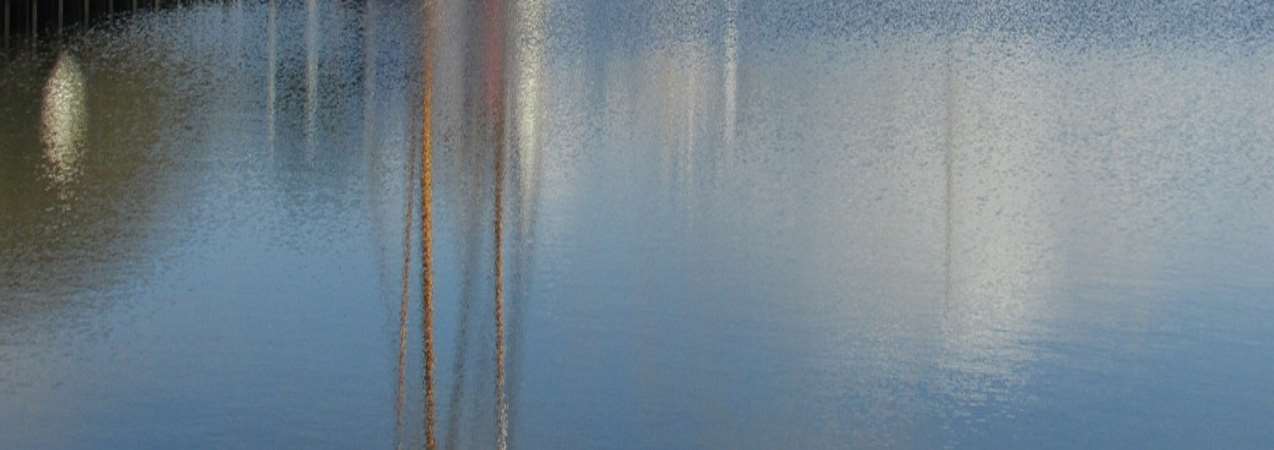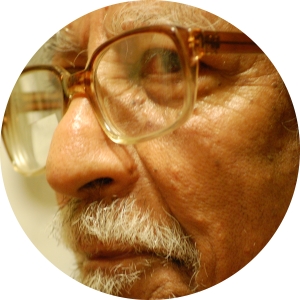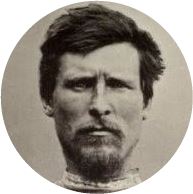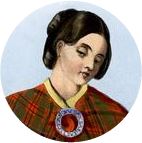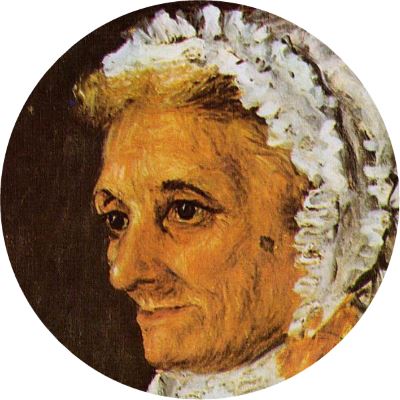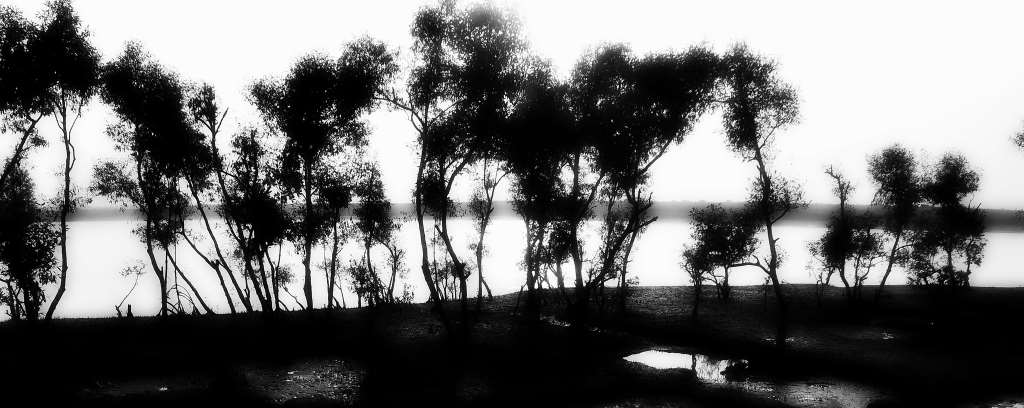‘It’s a sorry business this,’ Lord Gordon said to Hugh Stewart at breakfast. He had invited the handsome young Captain to join him for a spot of deer hunting at his estate in Ardersier. The younger man made a grimace and shook his head in dismay. He had strong views about people who thrived on the misery of others, and it was not often that he found someone in his circle who shared his views.
‘If I had my way,’ the Captain said, ‘after we have dealt with the rioters, I’d like to look into the action of the landlords too, they are far from blameless.’
‘Really?’
‘My Lord, you and I know that the Highlander is no less strongly attached to Christian values of live and let live, to his home and surroundings, as we are. Nobody asked him whether he wanted sheep to invade the land of his forefathers by stealth… what was he to do?’
‘Yes, dear boy, but we cannot let them burn and destroy property with impunity.’
‘But they did nothing of the sort my lord,’ said Hugh Stewart more vehemently than he had wanted, ‘they did very little damage. Did you know that they never killed not one single sheep for food.’
‘Really? That’s extraordinary. I wasn’t told.’
‘But I was there, my Lord, and I can vouchsafe for their forbearance… I wish I could testify to that in court, but nobody called me as a witness.’
‘Lord Stonefield is known for his sense of justice, my boy, I am sure he will listen to all the accounts and direct the jury to a fair verdict.’ Stewart demurred but said nothing.
 Photo Credit:
CC0 dannymoore1973
Photo Credit:
CC0 dannymoore1973
The Cameron brothers had, however, prevailed upon the Lord Advocate to revive the original case against Wallace and his fellow rioters who had attacked him and his farm in Culcairn to liberate their Black cattle, and on the twelfth of September 1792, the court in Inverness sat to try two different if not unconnected cases.
The town was full of peasants from all the nooks and crannies of Ross and Sutherland, in a show of support for their fellow victims.
Stonefield did not hide how much he disliked revisiting a case which had been closed, and knew that it was only because the brothers’ influence. But he was going to do a thorough job, allow both sides to present their views. In his summing up, he said that the animals in question were cows and horses which had been removed from their own pastures and illegally poinded, since insufficient legal notice had been given to the tenants as to the change that had been applied to existing pastures. The men were not armed and the Cameron brothers had met them with guns. In his view the defence was right to claim that it was self defence. The men were acquitted.
When the well wishers roaming the town heard the news, their cheer was loud enough to reach the skies. The times are a-changing, they said, the common man is no longer to be taken for granted. They drank many a toast to that and made merry, singing lustily, to the consternation of the landowners and the amusement of the townsfolk.
But their merriment was short lived, for soon after, the second trial began. The prosecution counsel, Mr Anderson opened up by firing his relentless salvo. The seven men on trial had riotously and feloniously instigated their fellow men to invade the property of law abiding landowners and farmers who had obtained their property by lawful means. They had made seditious proclamations at churches where worshippers had come to pray and hear sermons preaching peace and strict adherence to the laws of God and government. Instead they had been urged to seize upon and drive the lawful property of men of honour, defenceless flocks of sheep into the open, with a view to dispersing them and causing great loss of income to these honest men. Anderson’s oratory was very impressive and the jury, comprising mainly of the landed gentry could not help nodding in agreement to everything they heard. Hugh and John exchanged glum looks, and Michael Ross stared in front of him, amazed at what he was hearing.
The Jury must take into account the fact that these dangerous men came armed to the teeth, after spending £26.00 on gunpowder when they reach their verdict, the counsel said with great flourish of his arm. At this point the defence counsel jumped to his feet.
‘My Lord,’ said Mr Reid, ‘my learned friend is making claims that he cannot substantiate—’
‘I am going to call witnesses to testify to that, I am not in the habit of making wild claims.’
John Speirs, a gunsmith from Inverness was called, took his place at the bar and was sworn in and questioned.
‘Yes,’ he agreed, ‘on the day before the insurrection, a man came into my shop and bought gunpowder.’
‘You remember that you are under oath when you maintain this?’ Yes, he did.
‘How much did he spend, Mr Speirs?’ asked Mr Reid before the judge could tell him to wait for his turn in order to cross-examine the witness.
‘Sixteen pounds… I think.’
‘Was it twenty-six, sixteen or even only six pounds? Remember you are under oath.’
‘Aye, six pounds… I cannae remember… I meant to write it in my book, but I ran out of ink.’
‘Will the jury remember that most interesting fact, to wit, that Mr Speirs meant to write it all down, but, calamity of calamities, he ran out of ink.’ Even the people who had come to support the lairds were unable to keep a serious face.
‘Mr Speirs, the man who bought twenty-six, or maybe sixteen or maybe only six pounds worth of gunpowder… or even sixpence for that matter, can you see him here among the accused.’ Speirs hesitated, he studied the seven men intently but finally dwelled upon John Aird.
‘He looked very much like this man here,’ he said glumly pointing at Aird.
‘Looks very much like this man… John Aird. Did he look as much like this man here as sixpence looks like twenty-six pounds? But you still cannot swear that it was him… remember you are under oath.’
‘It was not him, but he looked like him.’
‘You are in a court of justice Mr Speirs, and these men’s fates, nay, lives are in your hands. Are you willing to condemn a man on the strength that he looks like a man who spent twenty-six pounds or—’
‘Will then learned counsel refrain from his tedious and repetitious remarks. Just say spent some money, will you?’ That was his Lordship.
‘You are willing to condemn a man on the strength that he looks like a man who spent eh… some money… buying gunpowder.’
‘The man could have been the cousin of the accused, and might have been buying the gunpowder for the rioters,’ Speirs said, in a desperate attempt at juggling his wish to see the men condemned with his need to avoid perjury.
Lord Stonefield was aghast at this notion and ordered the jury to discard the testimony.
Mr Reid was an adept at reading legal runes, and he knew that in spite of fighting the good fight, his men had no chance of being let off, so he set his sights on saving their necks. These were poor men driven to act rashly by the plight they had been subjected to. Thirty seven families had been evicted and those who had not starved to death were slowly getting there. These were God-fearing men, law-abiding and decent folk. None of them did what they did in a spirit of wantonness. Yes, they were misguided, but one does not get the full force of the law visited upon one for the sin of misguidance!
But there was no escaping the overwhelming testimonies of the respected proprietors of a number of settlements ranging from Allagrange to Scotsburn who spoke of the helplessness with which they saw their poor sweet lambs being mercilessly driven away, bringing tears to the eyes of the landed jury.
Demanding the ultimate penalty for the accused, Mr Anderson appealed to the jury to remember their responsibility as custodians of order in the land and not to let sedition of that magnitude go unpunished.
‘A lenient sentence,’ he said in vibrant tones, ‘was a key which people who had no respect for the laws of the land would indubitably use to open the gates of anarchy. If those dangerous men be allowed to go Scot-free, who knows to what dangers our sacred king and country may not be exposed. Do we wish the country to go the way of poor France? The members of the jury have no doubt witnessed with alarm the threatening behaviour of the people who have descended upon this peaceful town. All they want is a leader and the powder keg will light up and blow us all sky high and to smithereens.’
Lord Stonefield was not a happy man. He wished the accused men could be found not guilty, or that he had a humane sentence at his disposal, but his hands were tied by statutes, and it was clear that the law had been broken.
John Aird and Hugh Mackenzie were found guilty on all charges. Although a death sentence was within Lord Stonefield’s power to dispense, he could not make himself wear the black cap. Instead, he pronounced a sentence of transportation. Michael Ross and Fergus Davidson were found guilty of some of the charges and condemned to two years imprisonment. The charges against three others were unproven and they were discharged.
The condemned men were taken to the Tollbooth in Inverness, waiting for transportation. Hugh had not even been able to see his little girl, and was so distraught that he felt sure that he was not going to survive the perilous voyage to the other side of the world. He would willingly have traded a week in the bosom of his family, with Martha, Mam and the little girl, for what was left of his life. When he talked to John Aird, he never responded, it was as if he had not heard. He spent all his time praying to a God whose ears were turned away from the poor, Hugh would have said.
By now Hugh had lost whatever little faith he had, seeing with great clarity what Mam had said over the years. It was kinder to believe that there was no God, than to believe in a God who allowed such cruel things to happen in his world.
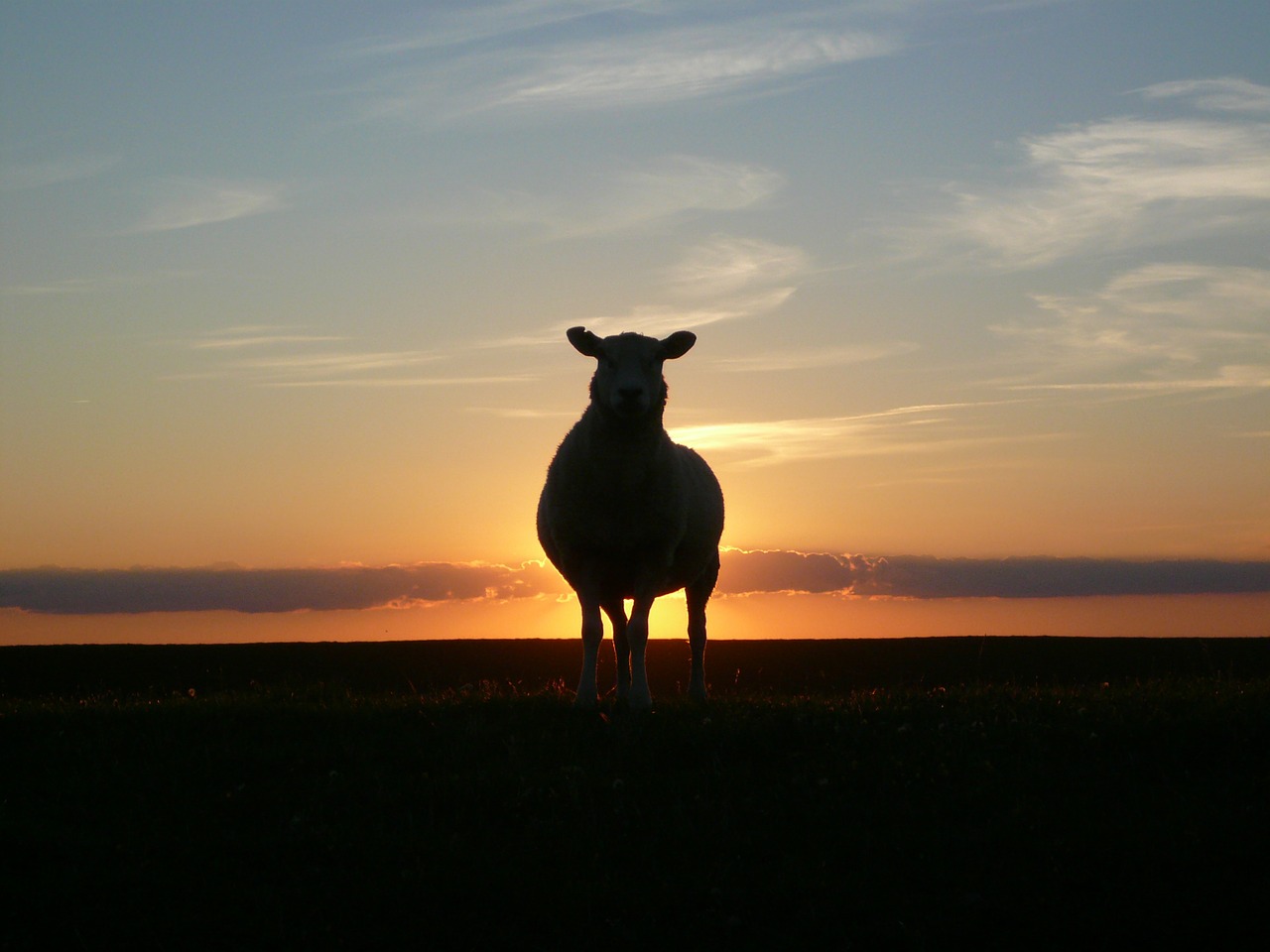 Photo Credit:
CC0 reetdachfan
Photo Credit:
CC0 reetdachfan
However, unbeknownst to either men, Lord Gordon had again asked Captain Stewart to visit him in Fort George, with instruction to keep this summons secret. When Hugh arrived, the good Lord ushered him in his study, ordered tea and locked the door. He reminded the younger man of a conversation they had had only a couple of weeks before about the Insurrection.
‘These men are being sent to their death in that hell hole that is Van Diemen’s Land,’ Lord Gordon said glumly, as he poured his visitor a glass of whisky. The Captain concurred.
‘And I say we cannot let that happen,’ said the Commander of His Majesty’s Armed Forces north of the border to the Captain’s amazement.
‘There is nothing we can do now, my Lord,’ cried Stewart in desperation.
‘Dear boy, there always is something to be done, and you are going to do it, and do it with your usual thoroughness and discretion,’ Lord Gordon said with absolute finality. And he would not elaborate, he smiled meaningfully and shook his head every time Captain Stewart emitted an opinion or asked a question. When they were saying good-bye, Lord Gordon kept Captain Stewart’s hand in his for a while, and whispered the cryptic words, ‘Carte Blanche, dear boy!’
On his way home after the enigmatic encounter, Stewart decided that the good Lord Commander was telling him, nay ordering him, to save the men, to help them escape and do everything in his power to convey them and their families to safety, and he immediately set to work, elaborating a watertight plan in his head.
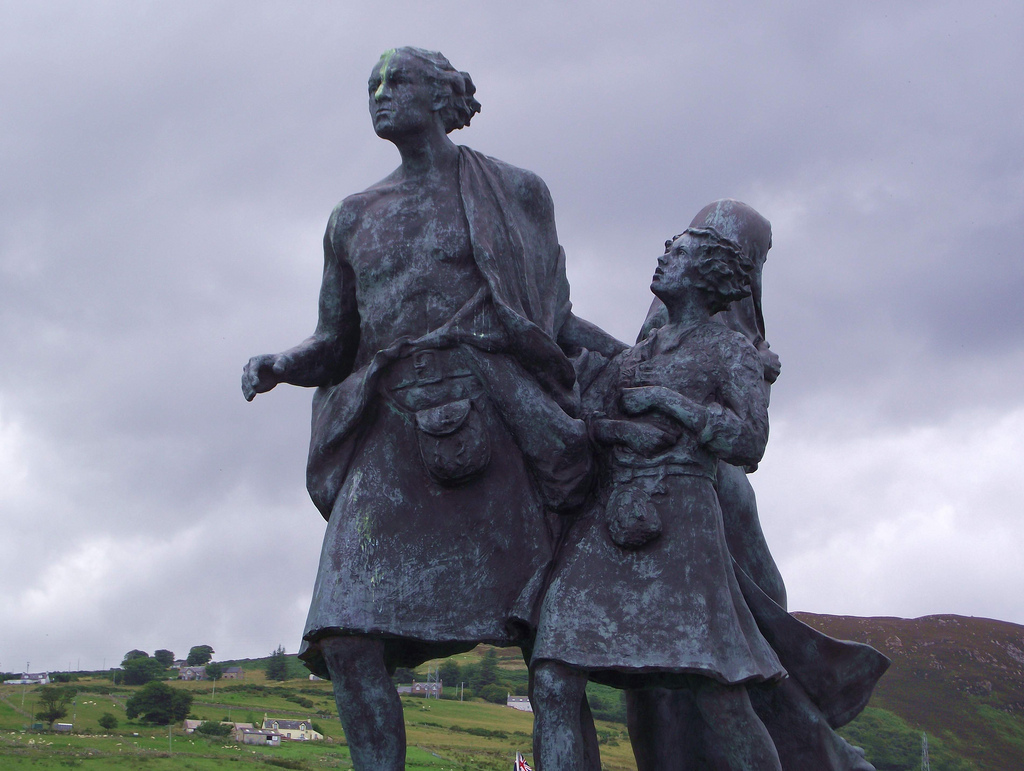 Photo Credit:
CC-BY Dave Conner
Photo Credit:
CC-BY Dave Conner
Captain Stewart and his trusted lieutenant Robert Howie went to the Tollbooth in Inverness, and told the guards there that the prisoners were to be entrusted unto their care. Obviously nobody dared question officers wearing such fine uniforms and hats. Mackenzie and Aird were convinced that within hours they would be in the damp dank hold of some hulk, bound for the end of the world. The guards nodded and disappeared, coming back shortly after, pushing and shoving the two prisoners, prodding them in the ribs with their muskets. Seeing this Captain Stewart said in a firm and authoritative voice that the men had been condemned for transportation and not to abuse by prison guards. It was not too common for anyone to notice the rough treatment prisoners received at the hands of gaolers, and the men were quite surprised. And their surprise turned to shock when Captain Stewart ordered them to unshackle the men completely, and they carried out the instructions keeping whatever sceptical thoughts they might have entertained to themselves. They condemned men were led to their coach, where Lieutenant Howie told them to be seated. He then gave them some bandages and liniments and told them to dry and clean their wounds. They took these and just kept them in their trembling hands doing nothing. John Aird’s fell from his hand and he did not even notice this.
They were too tired and confused to notice that there was no coachman, and that it was the Lieutenant who was seated at the driving seat. Although it was not cold, their teeth were chattering and they were trembling all over. I always thought I was a brave man, Hugh Breac Mackenzie was thinking, but adversity drains all courage from all but the bravest. Aird was benumbed and had no thoughts at all. The coach was bumping along on the uneven roads, and the men who had very little experience of this form of travelling had just started getting used to this when the Captain spoke.
‘Mackenzie, Aird, listen to me carefully, and do exactly as you are told. If they catch you, it isn’t going to be Botany Bay, but the gallows.’
Aird began to shake and whimper, not understanding what was happening.
‘Stop this, man, you are being rescued!’ Mackenzie was not sure that he had heard the word “rescued,” the captain’s Gaelic being rusty, and was perplexed, but Aird heard not one word, and continued shaking.
‘John Aird,’ said the captain suddenly, seizing the man by both shoulders and shaking him firmly, ‘you are now safe, you are not going to Botany Bay!’
Mackenzie was still unsure. No way, he thought, if at any point in his life he had been minded to believe in miracles, Mam had made sure she taught him how to expel the notion. No, the bosses are up to their usual tricks, although what they were, he had no idea. But the captain and his lieutenant had treated them with a greater courtesy than he had ever experienced from their class.
‘Some important people believe that you have been hard done by, and it has been decided to stop them sending you to Botany Bay, do you understand?’
Hugh’s doubt began to dissipate, though only gradually, like the morning mist lifting over the glen on a cloudy day as the sun began spreading its largesse around. Aird heard but did not immediately register their meaning. Then he made an effort to recall what he heard and understood that they were not going to be sent to Botany Bay.
The good Lord has answered my prayers, John Aird muttered to himself almost inaudibly, and with trembling hands, he suddenly seized Hugh by the shoulder and fairly shouted the same words:
‘D’you hear Hughie, the good Lord has answered our prayers, I knew He would, I told you He would!’ Hugh nodded and said nothing. The Captain and his lieutenant were smiling broadly at each other, pleased at having done what both thought was a worthy action.
‘Are you taking us to our wives, Captain, sir?’ asked Hugh, ‘are you taking us to our homes?’ Then suddenly turning to John Aird, Hugh burst into tears.
‘I am going to see her John, my wee bairn, do you hear? My wee baby… thank you O Lord!’ He was surprised to hear himself say that.
‘No,’ said the Captain, ‘we are not taking you home, it’s too dangerous, that’s the first place Sheriff McLeod’s men will be searching, but don’t be afraid, your loved ones have been taken care of and you will see them sooner than you may think.’ The men did not understand what was happening, but they now felt growing confidence in the two soldiers. No, they both decided, there is no trickery, and exhausted, they loosened up and leant their aching shoulders against the backrest of the coach, finding the regular bumping comforting if you took care not to let your head hit the roof of the coach. Aird had stopped shaking. Soon they were skirting the Beauly Firth, although ignoring the geography of the area they did not know this. The coach was heading for Dingwall and stopped just outside that town, reaching the destination before nightfall. The Captain gave the men a tent which they pitched outside the coach, and blankets, cheese and oatcakes and a bottle of whisky, and they were grateful that the October weather was not unbearable.
It had been decided that they would continue the journey at crack of dawn next day. When they were again on their way, the Captain explained to them that as they were wanted men, they could no longer bide in Ross safely and even in another county. If caught, they would be hanged. They would have to have new names and identities, and he had already arranged for Hugh to be given the papers of Angus Smith. As for Aird, he was to be called Fergus Hicks. Ideally they should go live in another country beyond the reach of the harsh laws of this country. It would be easy to get them over to Nova Scotia. That was the safest option, how did they like that? John Aird immediately said that if his family could join him, he would be more than happy to go there. Hugh was lost in thought, and said nothing. The captain took this for acquiescence, and said that he had already made provisional arrangements for a quick departure, as long as they made as if they did not know each other for the duration of the crossing, seeing that their descriptions will have been in circulation. In the meantime, they would be lodged in a safe house on the coast, near Cromarty, until their ship was ready for departure. He paused to let the information sink in, and noticed that Hugh seemed confused. He asked him if he had arrived at the same decision as John Aird. No sir, he said thoughtfully, I am a Highlander and anywhere else I would be lost. Like a Black Cattle in a peat bog.
The Captain showed great understanding for Hugh’s position. Yes, he said, he did not think it was right to dictate to free Scotsmen how and where they should live. And I wouldn’t mind saying that it was this spirit which moved me to undertake this venture so enthusiastically, albeit on the prompting of someone very high up who I am not at liberty to name. In the meantime you will both have to go to that safe house on the coast that I mentioned. It is derelict to some extent, but it still has roofs and walls, and no one is going to find you there. He did not explain that it was part of a lot that the Duchess of Sutherland had acquired, with the intention of turning it over, in the not so distant future, to dispossessed tenants, as they transformed themselves into fishermen, so as to make way for more sheep. Hugh who had a suspicious nature, and who seized on the house being located on the coast, was suddenly assailed by the thought that they were being tricked into something, but fortunately he was able to dismiss this idea.
The captain had said that he would see his family soon enough. What did he mean by soon? He missed Martha more than he thought he would, what a fine woman! He knew that she understood why he had to go to set his cows free from the Cameron brothers, but he suspected that when they were planning the big insurrection, she was not at one with him, even if she never said one word. And his little girl… he loved her with all his heart whatever Martha might think. Mam! That he loved her, he had not the slightest doubt, but he knew that he was still in awe of her, she was a tough no-nonsense woman, no wonder Da felt the same. She was such a tower of strength, was so full of common sense, was so upright even if she had no time for the God of the rich. Knowing that she was around made him fear less for the safety of Martha and the baby.
‘Captain Stewart, sir, my wife, my wee bairn—’
‘Mackenzie, trust me they are well, and you will see them, I promise. Soon.
The carriage rolled on all night and reached a small abandoned hamlet west of Cromarty a little after sunset. The house seemed empty from outside, but when a horse neighed, it suddenly sprang to life and the doors were burst open and Hugh could swear that time stood still as he saw an image that would stay with him for the rest of his life: Martha with the baby wrapped in a grey blanket in her arms, running towards him, her shawl unable to keep up with her speed gently giving up and drifting towards the ground behind her, her lambent hair, glowing in the moonlight rippling like waves, giving her the appearance of a female warrior poised to strike at her foe. He had never seen her more beautiful. Mrs Aird and Mam must have been there, but he never saw them. Tears of joy gushed out from all eyes. So that was how soon the admirable captain meant by soon!
Stewart and Howie exchanged congratulatory looks, and looked at the joyous reunion with great happiness. Mam Mackenzie immediately decided that after such a long journey, what the travellers needed was a nice large bowl of porridge, and the women set about turning this into reality. Hugh had deftly prised the little wean from her mother’s arms and experienced a sensation akin to ecstasy as he pressed the fragile little body to his own.
The military men declined an invitation of a rest before their return journey, but did full justice to Mam’s porridge. The admirable pair then said their good-bye and Hugh Stewart promised that he would be back when other arrangements were made.
The condemned men could hardly believe their good fortune. Aird was convinced that going to Nova Scotia was the best solution. Hugh, infected by the enthusiasm of his cousin, began to waver in his determination to stay in the land of his birth come what may. Mam said she would willingly go where Hugh wanted them to be. This time he asked Martha, but the woman, never used to being asked her opinion, was taken aback, and agreed with Mam, You are the master of the house, Hugh Mackenzie, it’s for you to decide.
A few days later, the captain showed up and said that the Northern Star was setting sail from Cromarty for Montreal in six days’ time, and that there was still time for MacKenzie to change his mind. No one, least of all Hugh himself knew what his reaction was going to be, and he was as surprised as the others to hear him say with unnecessary indignation, ‘We are Highlanders born on this Scottish land of our fathers, we have drank Highland waters and breathed the cold fresh air of the glens, we have been nourished by oats grown on our rocky fields, no Captain, no one can make me leave this land.’ Martha nodded, but only because she knew that he was speaking in such an uncalled for aggressive manner in order to convince himself of the righteousness of his decision. The Captain was puzzled but said that the choice lay with him.
He took John Aird aside, gave him some papers and money, reminded him that there was no chance of his ever coming back, and instructed him on the steps to be taken regarding their big adventure. Aird nodded and smiled happily, clutching the papers like they were his lifeline, which they were. He then gave Hugh some papers and money, and explained about a waterway which was planned.
‘We are at the dawn of a new age,’ he said with an almost religious fervour, ‘soon the country will be unrecognisable, it will be the age of machines and industry. A sort of revolution, if I may say so. The people in London have plans for the union which will ensure that we stay the topmost nation of this world until the end of time. You have not heard of Mr Watt, Mackenzie, but that man is a genius of the sort that comes into this world but once every three or four centuries. Like us he is a Scotsman… Many years ago the government entrusted him with the study of a bold plan to create a waterway, a navigable canal if you like, here in this part of the world, which will, in the first instance, create jobs for you people being cruelly driven from your tenant farms, but as you know, there is a sad shortage of good roads in the country… and by God, Mackenzie, we will need these roads, I can tell you! And London has finally approved the plans for its construction, and put another son of our soil, Mr Thomas Telford in charge of the project.’
Hugh remembered the knocks he had taken on the head as they were travelling to Cromarty, and smiled. The Captain was so carried away by his enthusiasm and continued breathlessly, ‘It will carry goods which will be manufactured all over the country, it will be wide enough to enable the free passage of wide cargo boats.’ Hugh was beginning to wonder whether the good Captain was not deluded about his capacity. In what way was he going to be part of this scheme, he was no craftsman, he only knew how to raise cows and grow oats. The Captain explained that he had written a letter to Patrick Gordon, the son of an old family retainer who was the foreman at a site near Fort Williams, where he understood there was always a need for strong and willing arms, as there was a lot of digging to be done, in order to analyse the soil and rock formation. It is a government project, so the pay will be fair and regular, I’ll warrant you. He demurred slightly at this point, unsure of what he was warranting, but he had won Hugh over. Yes, he would take his family to Fort Williams, accept the new name the good captain had given him, and never again would he have to depend on the dubious bounty of greedy landlords.
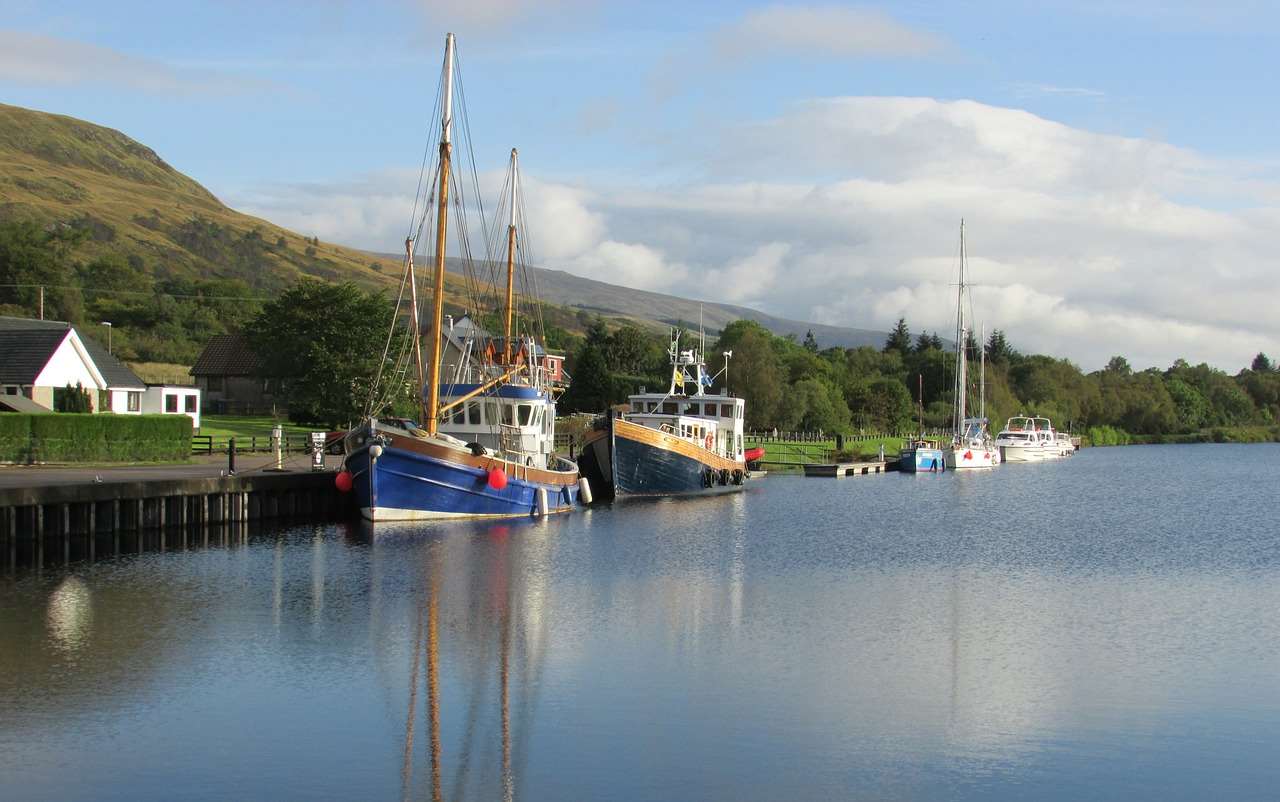 Photo Credit:
CC0 Kasman
Photo Credit:
CC0 Kasman
